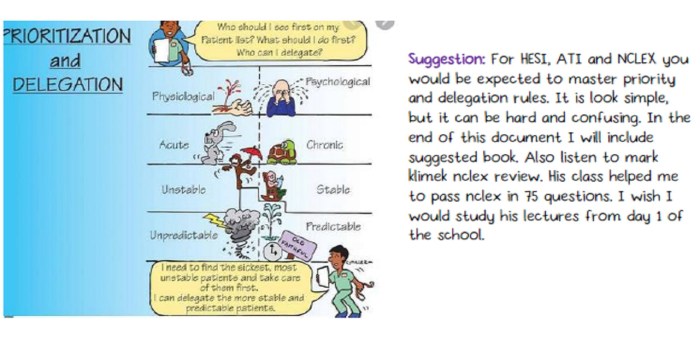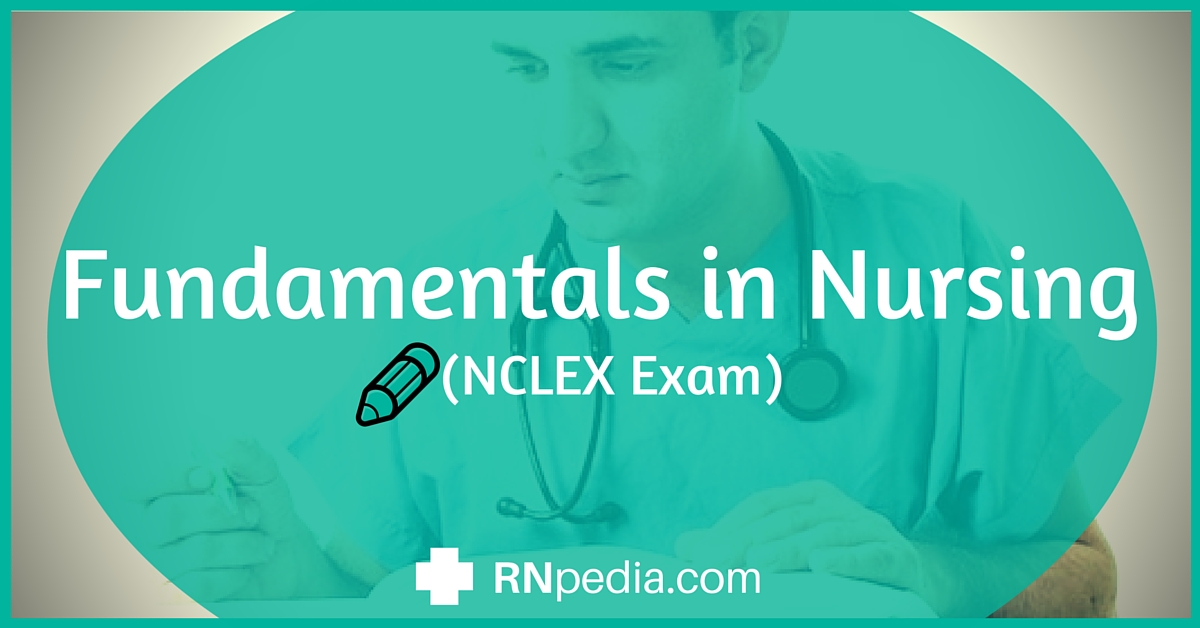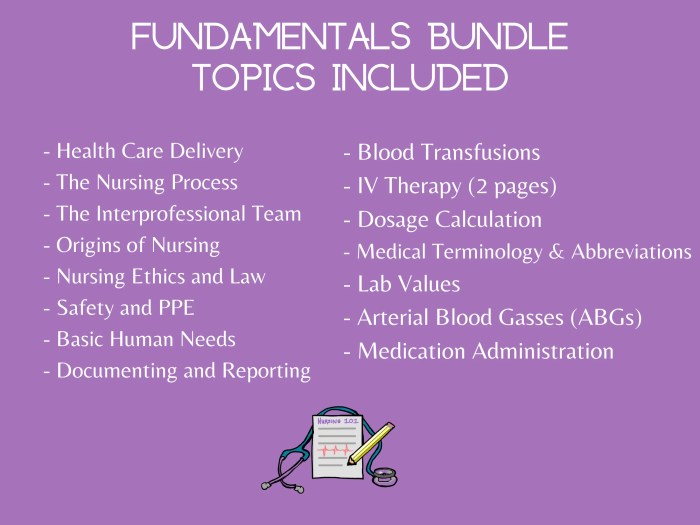Embark on a journey through the realm of nursing fundamentals with Exam 4 Fundamentals of Nursing. This comprehensive guide unveils the secrets to understanding the essential concepts, mastering exam strategies, and achieving nursing excellence.
Prepare to delve into the depths of nursing practice, unraveling the intricacies of health assessment, pharmacology, fluid and electrolyte balance, and the indispensable nursing process.
Exam Overview

Exam 4 in Fundamentals of Nursing holds immense significance as it evaluates your understanding and application of the fundamental principles and concepts covered throughout the course. This comprehensive exam aims to assess your ability to integrate knowledge, analyze situations, and make informed decisions as a nurse.
Exam Format
The exam typically comprises a mix of question types, including multiple-choice questions (MCQs), short answer questions (SAQs), and essay questions. MCQs test your factual knowledge and understanding of key concepts, while SAQs and essay questions assess your ability to apply knowledge to real-life scenarios and demonstrate critical thinking skills.
The exam duration and grading criteria may vary depending on the specific institution and course structure. It is crucial to familiarize yourself with these details and allocate sufficient time for preparation.
Key Concepts: Exam 4 Fundamentals Of Nursing

Exam 4 delves into fundamental concepts that are crucial for nursing practice. These include:
- Nursing Process: The systematic approach to patient care, encompassing assessment, diagnosis, planning, implementation, and evaluation.
- Health Assessment: The systematic collection and analysis of patient data to identify health status and potential problems.
- Pharmacology: The study of drugs, their effects on the body, and their use in treating diseases.
- Fluid and Electrolyte Balance: The maintenance of appropriate levels of fluids and electrolytes in the body for optimal physiological functioning.
Exam Preparation Strategies
Ace your Exam 4 by implementing these effective study techniques that will enhance your knowledge retention and boost your confidence.
Mastering the art of time management is crucial. Allocate specific study slots throughout the day and stick to them religiously. Prioritize topics based on their difficulty and weightage in the exam.
Active Recall
Challenge your memory by actively recalling information without referring to notes. Use flashcards, write down concepts from memory, or engage in discussions with peers to strengthen your understanding.
Practice Questions
Engage in ample practice by solving past exam papers, attempting mock tests, or working through practice questions. This will familiarize you with the exam format, question types, and time constraints, boosting your preparedness.
Sample Questions
This section provides a sample of questions that may appear on the Fundamentals of Nursing Exam 4. These questions cover a range of topics and formats, including multiple choice, short answer, and case studies. By reviewing these sample questions, you can gain a better understanding of the types of questions you can expect on the exam and prepare accordingly.
Multiple Choice
Multiple choice questions present a question or statement followed by several possible answers. Only one answer is correct. When answering multiple choice questions, carefully read the question and each answer option before making your selection.
- Which of the following is a priority nursing intervention for a patient with a urinary tract infection (UTI)?
- Which type of wound requires a moist wound healing environment?
- What is the most common type of medication error?
Short Answer
Short answer questions require you to provide a brief, concise answer to a specific question or prompt. When answering short answer questions, be sure to provide clear and relevant information.
- Describe the nursing care plan for a patient with a new diagnosis of diabetes.
- Explain the importance of patient education in medication management.
- Discuss the ethical considerations involved in caring for a patient with a terminal illness.
Case Studies
Case studies present a detailed scenario or situation and ask you to apply your nursing knowledge and skills to analyze the case and make decisions. When answering case study questions, carefully read the case and identify the relevant nursing concepts and interventions.
- A 65-year-old patient with a history of heart failure is admitted to the hospital with shortness of breath. Describe the nursing assessment, interventions, and expected outcomes for this patient.
- A 3-year-old child is brought to the clinic with a fever and rash. Discuss the differential diagnoses and appropriate nursing care for this child.
- A pregnant woman is diagnosed with gestational diabetes. Explain the nursing management and patient education required for this condition.
Test-Taking Tips

To excel in Exam 4, implementing effective test-taking strategies is crucial. These strategies can enhance your performance and increase your chances of success.
Exam 4 for Fundamentals of Nursing is coming up soon, and I’m feeling a little stressed. I’ve been studying hard, but there’s just so much material to cover. I wish I had a magic wand to make it all disappear.
But hey, at least paper clips are still affordable! Did you know that paper clips sell for 23 cents these days? That’s not too bad. Back to studying… I hope I can ace this exam!
Managing Time Effectively
Time management is paramount. Allocate time wisely to each section, prioritizing the most challenging questions. Use a watch or timer to stay on track and avoid spending excessive time on any single question.
Using Critical Thinking Skills
Apply critical thinking skills to analyze questions and identify the underlying concepts. Read each question carefully, considering the context and implications. Eliminate options that are clearly incorrect and select the answer that best aligns with the question.
Eliminating Distractions
Create a conducive testing environment by minimizing distractions. Choose a quiet and well-lit space where you can focus solely on the exam. Inform others not to disturb you during the testing period.
Resources

Preparing for Exam 4 requires a comprehensive approach that involves utilizing various resources. These resources can enhance your understanding of the key concepts, provide practice opportunities, and boost your confidence on exam day.
Let’s explore some helpful resources that can aid your preparation:
Textbooks, Exam 4 fundamentals of nursing
Textbooks serve as the foundation for your nursing knowledge. Refer to the assigned textbook for Exam 4 to review the relevant chapters and concepts. Take notes, highlight important passages, and engage with the content actively.
Online Quizzes
Online quizzes provide an interactive way to test your understanding of the material. There are numerous websites and platforms that offer free or paid quizzes covering a wide range of nursing topics. By taking these quizzes, you can identify areas where you need additional study and reinforce your knowledge.
Study Groups
Joining a study group can be a valuable resource for Exam 4 preparation. Study groups provide a collaborative environment where you can discuss concepts, quiz each other, and learn from different perspectives. Consider forming a study group with classmates or reaching out to online forums to connect with other nursing students.
Questions Often Asked
What is the significance of Exam 4 in Fundamentals of Nursing?
Exam 4 serves as a crucial assessment of your understanding of core nursing concepts, preparing you for the challenges of clinical practice.
How should I prepare for Exam 4?
Effective preparation involves active recall, practice questions, and time management techniques. Engage with the material regularly and seek support from study groups or online resources.
What are the key concepts covered in Exam 4?
Exam 4 encompasses essential concepts such as the nursing process, health assessment, pharmacology, and fluid and electrolyte balance.
